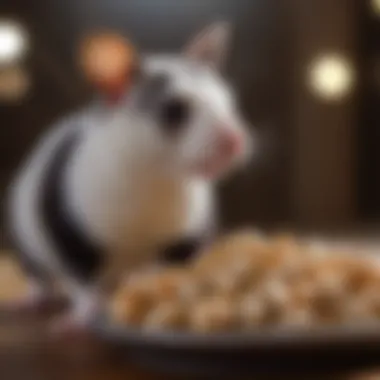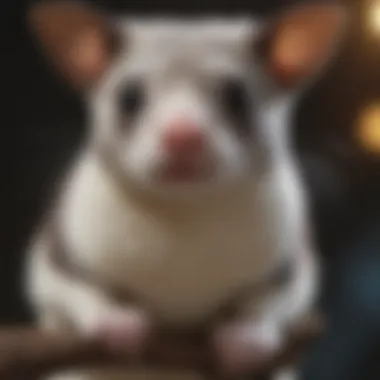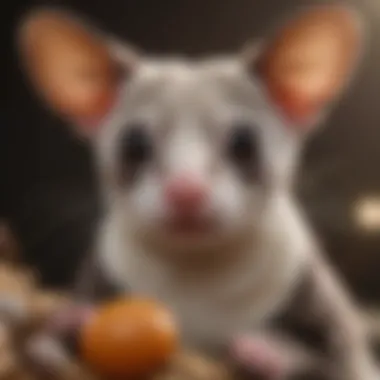Essential Guide to Calcium Supplements for Sugar Gliders


Intro
Calcium is a crucial element in the diet of sugar gliders. Understanding the role it plays can greatly impact their health and longevity. This section will delve into the importance of calcium, the variety of supplements available, and how to maintain a balanced diet for these unique pets. Sugar gliders, as marsupials, have distinct nutritional requirements that differ from typical household pets. Knowing these can help in preventing serious health issues often associated with calcium deficiencies.
Understanding Your Pet
Pet Behavior Basics
Sugar gliders are social creatures. They thrive on interaction, both with their owners and with other sugar gliders. Understanding their behavior is crucial for proper care. They tend to bond deeply with their human companions, showcasing playful and curious traits. Paying attention to their body language can help in recognizing their moods. For instance, if they are puffed up, it may indicate stress or discomfort. Providing a stable environment and regular interaction is key.
Common Breed Characteristics
Sugar gliders are small, nocturnal marsupials. With big eyes and a soft coat, they are often known for their charming demeanor. They usually grow around 5 to 6 inches long, not counting their tail, which can add another 7 to 8 inches. Their social nature makes them prone to loneliness if housed alone. Thus, many owners opt to keep multiple gliders together.
Species-Specific Needs
Sugar gliders require a specialized diet that includes protein sources, fruits, and leafy greens. Calcium plays a vital role in bone development, especially in younger gliders. Without adequate calcium, they can experience metabolic bone disease. Therefore, understanding their dietary requirements is essential. The right balance of nutrients can prevent health concerns and ensure that they thrive in captivity.
Pet Care and Maintenance
Feeding Guidelines
Feeding sugar gliders properly is essential for their health. A varied diet should include fruits, vegetables, and protein sources. Supplements can enhance their diet, providing necessary calcium and other vitamins. For example, using products like Repashy Superfoods or Zoo Med's Avian Calcium can help in achieving the right balance. Owners should consult a vet to determine the appropriate amounts specific to their glider's needs.
Grooming Essentials
Sugar gliders require minimal grooming. Regular check-ups of their fur and nails help in maintaining their hygiene. Owners should gently handle their gliders, checking for any signs of discomfort or issues on their coats. Bathing should be avoided unless absolutely necessary, as their skin is delicate and prone to irritation.
Hygiene Practices
Maintaining a clean environment is crucial. Regularly changing bedding and cleaning cages keeps harmful bacteria at bay. Fresh water should always be available. Owners should monitor the cleanliness of food areas to prevent health issues in their pets.
Training and Development
Basic Commands and Skills
Training sugar gliders can foster a better bond between owner and pet. Simple commands can be taught through positive reinforcement, like offering treats. Teaching them to come when called is a helpful skill.
Behavioral Training Techniques
Understanding how to correct unwanted behaviors is vital. Instead of punishment, redirecting their attention can be far more effective. Ensuring they have enough playtime can also prevent destructive habits.
Addressing Common Behavior Issues
Common problems include biting or excessive vocalization. Recognizing triggers for these behaviors allows owners to manage them better. Providing ample mental stimulation and companionship can greatly reduce negative behaviors.
Health and Wellness
Routine Vet Check-ups
Regular veterinary visits are essential for sugar gliders. These check-ups help in early detection of health issues and maintain their overall well-being. Vets can also offer guidance on proper nutrition and supplements.
Vaccination Needs
Vaccinations are important for preventing disease. owners should consult with their vet to create an appropriate vaccination schedule, ensuring their pet's health throughout life.
Recognizing Signs of Illness
Some signs to watch for include lethargy, changes in appetite, or abnormal behaviors. Quick action can make a significant difference. Noticing these signs early, and consulting with a vet can help prevent more serious health problems.
Enrichment and Activities


Indoor vs.
Outdoor Activities
Providing enrichment is key for mental health. Indoor activities can include climbing structures and tunnels, while outdoor activities should be supervised. Creating a safe space allows them to explore while minimizing risks.
Interactive Toys and Games
Toys that stimulate curiosity are beneficial. Choose toys that encourage exploration and playful activities, keeping the sugar glider engaged.
Socialization Opportunities
Encouraging social interactions with other sugar gliders or humans fosters emotional health. Regular playtime can strengthen bonds and keep them happy.
Foreword to Sugar Gliders
Sugar gliders are fascinating creatures that have gained popularity as pets in recent years. They are small, nocturnal marsupials native to Australia and New Guinea. Understanding sugar gliders is essential for their care, particularly in relation to their dietary needs. This article will discuss these needs, focusing on calcium supplements, which play a crucial role in their health.
Overview of Sugar Gliders
Sugar gliders are recognized for their unique features and behavior. They are typically about six to twelve inches in length, with a membrane stretch between their front and back legs that allows them to glide. This physical adaptation is not just for fun; it helps them escape predators in their natural habitat. They live in social groups and have a complex system of communication, making them quite engaging pets.
However, owning a sugar glider comes with numerous responsibilities. Understanding their social, environmental, and dietary needs is not just essential; it is mandatory for ensuring their health and longevity. With proper care, sugar gliders can live up to 12 years or more in captivity.
Importance of Diet in Sugar Glider Care
Diet is a fundamental aspect of sugar glider care. These animals have complex nutritional requirements. They primarily consume nectar, fruits, and insects in the wild. Without a well-balanced diet, their health can deteriorate. One crucial nutrient is calcium, which needs to be carefully monitored to prevent deficiencies.
Maintaining proper calcium levels is vital for various physiological functions. Calcium helps build strong bones, supports nerve function, and aids in muscle contraction. A deficiency can lead to severe health issues, including metabolic bone disease. Therefore, pet owners must educate themselves about the dietary needs of sugar gliders and the role of calcium supplements. Ensuring that a sugar glider receives all necessary nutrients will greatly enhance its quality of life.
The health of your sugar glider greatly depends on a balanced diet. A well-thought-out nutritional plan that includes proper calcium intake is essential.
The Role of Calcium in Sugar Glider Health
Calcium plays a crucial role in the overall health of sugar gliders. These small marsupials require a specific balance of nutrients to support their physiological functions, growth, and well-being. A well-thought-out diet, which includes adequate calcium intake, is fundamental to preventing health issues. Calcium is not only involved in bone development but also plays a part in muscle function and nerve transmission. Due to their unique dietary needs, sugar gliders are susceptible to various health concerns if their calcium levels are not monitored. Understanding the significance of calcium helps pet owners to provide better care for their furry companions.
Physiological Functions of Calcium
Calcium serves multiple physiological roles, which are essential for sugar gliders. It is primarily known for its structural function as a crucial component of bones and teeth. However, its roles extend beyond this basic function. Calcium is vital for:
- Muscle contractions: Calcium ions trigger muscle cells to contract, making it necessary for movement and daily activities.
- Nerve transmission: Calcium aids in the release of neurotransmitters, essential for communication between nerve cells, thus affecting behaviors and reactions.
- Blood clotting: This mineral is critical for the coagulation process, helping sugar gliders respond appropriately to injuries.
- Hormonal secretions: Calcium levels influence the release of hormones that regulate various bodily functions, maintaining homeostasis.
It is clear that calcium contributes to vital processes in sugar gliders. Therefore, ensuring adequate calcium intake is key to maintaining these functions efficiently.
Consequences of Calcium Deficiency
Calcium deficiency in sugar gliders can lead to significant health issues. Without enough calcium, these animals face several risks, which can manifest in various forms:
- Osteoporosis: Insufficient calcium can lead to weakened bones, increasing the risk of fractures and skeletal deformities.
- Muscle spasms: Low calcium levels may cause involuntary muscle contractions, leading to discomfort and mobility issues.
- Nervous system problems: A deficiency can impair nerve function, causing behavioral changes or neurological disorders.
- Compromised immune function: Calcium is important for a healthy immune response; deficiency could leave sugar gliders more susceptible to infections.
It is essential for sugar glider owners to recognize the signs of calcium deficiency to intervene promptly.
Types of Calcium Supplements
Understanding the types of calcium supplements available is vital for anyone seeking to maintain the health of their sugar gliders. The right supplement can mitigate calcium deficiency risks and support overall well-being. Improper supplementation, however, can pose its own challenges. Therefore, educating oneself on the sources and forms of calcium can lead to better choices.
Natural Calcium Sources
Sugar gliders can obtain calcium from natural dietary sources. Fresh fruits and vegetables can contribute essential nutrients, along with high-calcium foods like kale, broccoli, and dandelion greens. Additionally, small amounts of yogurt or cheese can be provided as treats, though moderation is key due to their lactose content.
Highlights of Natural Sources:
- Diversity: Using a variety of natural foods ensures a balanced intake of nutrients.
- Flavor: Sugar gliders often enjoy fruits and vegetables, making it easier to encourage consumption.
- Bioavailability: Calcium from natural sources may be more easily absorbed than from commercial supplements.


Commercial Calcium Supplements
For those who might struggle to provide enough calcium through diet alone, commercial supplements are available. These often come in powders, liquid, or tablet forms. Popular products include Repashy Calcium Plus and Zoo Med ReptiCalcium. When selecting a commercial calcium supplement, it’s essential to look for one that doesn’t contain excessive phosphorus, as this can inhibit calcium absorption.
Considerations for Using Commercial Supplements:
- Labels: Always read the ingredient list.
- Dosage: Follow recommended serving sizes. Over-supplementation can lead to health issues.
- Types: Liquid options may be easier for some sugar gliders to consume than tablets or powders.
Comparative Effectiveness of Different Forms
When contemplating between natural and commercial supplements, the effectiveness can vary. Some sugar gliders may prefer the taste of natural foods, while others may benefit more clearly from the concentrated doses of commercial supplements. Research indicates that a combination of both may yield the best results. Trials have shown that sugar gliders receiving a balanced diet alongside appropriate supplements had better health outcomes.
Key Comparisons to Consider:
- Taste Preference: Sugar gliders might reject certain supplements.
- Nutrient Density: Natural foods offer a broader range of nutrients, while supplements may focus solely on calcium.
- Cost: Natural sources may be less expensive in the long run than frequent purchases of commercial products.
A combination of natural and commercial calcium sources can maximize the health benefits for sugar gliders.
Understanding the types of calcium supplements can empower sugar glider owners to make informed decisions that support the health of their pets. Each source offers unique benefits and potential downsides that warrant careful consideration.
Assessing Calcium Needs
Assessing calcium needs is a critical component of ensuring the health and well-being of sugar gliders. These small marsupials require a balanced diet that supports their unique physiological needs. Calcium plays a vital role in several bodily functions including bone development, muscle contraction, and nerve signaling. An appropriate calcium intake can prevent conditions such as metabolic bone disease, which is common in sugar gliders that do not receive enough of this essential mineral.
Evaluating the calcium requirement of sugar gliders involves understanding both their current dietary habits and the specific recommendations from veterinary experts. This assessment enables pet owners to tailor their diet to meet the animals’ needs, thereby promoting longevity and overall health.
Recommended Calcium Intake for Sugar Gliders
The recommended calcium intake for sugar gliders varies with age, weight, and overall health. Generally, for adult sugar gliders, the dietary calcium level should be around 1,5:1 calcium to phosphorus ratio. This means that for every 1.5 parts of calcium, there should only be 1 part of phosphorus in their diet. Younger sugar gliders may need even higher calcium levels due to their rapid growth and development.
The following points outline key recommendations for calcium intake:
- Adult Sugar Gliders: Approximately 0.2 to 0.5 grams of calcium per day is suitable, depending on the individual.
- Joeys and Young Gliders: Their requirements increase to about 0.5 to 1 gram of calcium per day, responding to their growth phase.
- Breeding Gliders: Female sugar gliders during lactation and pregnancy often require elevated levels of calcium to support their young. They might need up to 1.5 grams each day.
On top of that, pet owners must be aware that calcium supplements should be given with some caution, taking care not to exceed these levels to avoid potential health issues.
Factors Influencing Calcium Requirements
Several factors can influence calcium requirements for sugar gliders. Understanding these factors can help in adjusting their diets appropriately:
- Age: Young and growing sugar gliders require more calcium compared to adults. Their needs decrease as they reach maturity.
- Health Status: Illness or prior medical conditions may affect how much calcium a sugar glider needs. Healthier gliders may have lower requirements.
- Diet Composition: The nutritional values of the foods that sugar gliders consume will heavily impact their calcium needs. Diets low in natural calcium sources will necessitate supplements.
- Time of Year: Some metabolic needs may vary according to the seasons, impacting their calcium consumption.
In summary, singular attention to these factors can help caregivers better assess and provide for their sugar gliders. By doing so, they can create a balanced and nutritious diet catered to the unique needs of these fascinating animals.
Attention to calcium intake can greatly affect the vitality and health of sugar gliders. Proper assessment is vital for their well-being.
How to Implement Calcium Supplements
Understanding how to implement calcium supplements for sugar gliders is crucial for maintaining their overall health. This section will cover the methods of supplementation, how to seamlessly integrate these with their diet, and ways to monitor their well-being effectively.
Choosing the Right Supplementation Method
When selecting a method for calcium supplementation, pet owners should consider several factors. Not all methods are suited for every sugar glider. One common method is the use of powder supplements, which can be easily mixed into their food. Brands like Rep-Cal and Zoo Med offer products specifically designed for small animals like sugar gliders. Another method is liquid supplements, which can be added directly to their drinking water or food. Each method has its pros and cons, and it is essential to choose one that matches the unique needs of your sugar glider.
- Powder Supplements: These allow for easy dosage control and can be mixed with various foods. Be careful with the quantity to avoid overdosing.
- Liquid Supplements: These may be preferable for gliders that are picky eaters, as they can be hidden in their water.
It's also important to choose a supplement that has the right balance of calcium and other vitamins, like vitamin D3 that helps in absorption, ensuring overall effectiveness.
Combining Supplements with Diet
Combining calcium supplements with a proper diet is vital for sugar glider health. A diet high in fruits, vegetables, and protein is essential, but it may not always provide enough calcium on its own. Therefore, supplementation becomes necessary. Incorporate supplements alongside fresh foods, such as a mixture of fresh fruits, vegetables, and specific high-calcium foods like kale or dandelion greens.


- Use calcium powder to dust insects or fruits.
- Add liquid supplements to their fresh food mixtures.
- Observe your sugar glider’s preferences to ensure they eat both the diet and any added supplements.
Monitoring Sugar Glider Health During Supplementation
As with any supplementation, monitoring the health of sugar gliders during this process is essential. Regularly check for any changes in their behavior, appetite, or physical condition. Pay attention to signs that may indicate an imbalance in calcium intake, such as lethargy or weakness.
- Keep a record of their diet, noting changes and any new supplements introduced.
- Regular veterinary check-ups can help ensure their calcium levels are within normal ranges. Blood tests can provide insights that are difficult to assess otherwise.
- If any unusual symptoms arise, consult a veterinarian immediately to assess potential issues.
Following these steps will enable you to implement calcium supplements effectively, ensuring your sugar glider remains healthy and vibrant.
Potential Health Risks of Excess Calcium
Understanding the potential health risks of excess calcium is crucial for sugar glider owners. While calcium is essential for their health, too much can lead to serious issues. It is necessary to strike a proper balance in their diet to ensure they thrive.
Symptoms of Hypercalcemia
Hypercalcemia refers to an unusually high level of calcium in the blood. This condition can cause various symptoms that may compromise the health of sugar gliders. Common symptoms include:
- Increased thirst and urination
- Loss of appetite
- Lethargy
- Weakness
- Vomiting
If you notice these signs in your sugar glider, it is vital to act quickly. Left untreated, hypercalcemia can lead to kidney problems and other serious complications. Monitoring calcium intake is essential to prevent these issues from arising.
Long-term Impact on Health
The long-term impact of excess calcium is another important consideration. Chronic hypercalcemia can lead to several health problems, including:
- Kidney damage: Elevated calcium levels can harm the kidneys, leading to decreased function or failure over time.
- Bone issues: Excessive calcium can disrupt normal bone metabolism, potentially causing weak bones and fractures.
- Cardiovascular problems: High levels of calcium can affect heart function and lead to cardiovascular diseases.
Veterinarians emphasize the importance of monitoring dietary calcium levels to prevent long-lasting health issues. A balanced approach ensures that sugar gliders receive the necessary nutrients without the risk of over-supplementation. Always consult with a veterinarian when determining the right calcium intake for your pet.
"Maintaining the right balance of calcium is crucial. Too much can harm your sugar glider more than you think."
Advice from Veterinarians
Veterinarians play a crucial role in guiding pet owners about the health and well-being of sugar gliders. This section emphasizes the significance of expert veterinary advice, especially regarding the dietary considerations and calcium supplementation for these unique pets.
Veterinary recommendations are not merely suggestions; they are based on clinical experience and research related to sugar glider needs. Understanding these recommendations can aid in preventing health issues and ensuring that sugar gliders enjoy a balanced diet.
Veterinary Recommendations for Sugar Glider Diets
A vet's guidance regarding the diet of sugar gliders includes a focus on proper calcium levels. Calcium is vital for bone health, muscle function, and overall vitality in these small marsupials. Vets often recommend a diet that consists of fresh fruits, vegetables, insects, and high-quality commercial pelleted food designed specifically for sugar gliders. This balanced diet incorporates sources rich in calcium, such as leafy greens and some fruits.
It's important to keep in mind the right proportion of calcium to phosphorus in sugar glider diets. The ideal ratio is often cited as 2:1. Exceeding phosphorus can lead to calcium absorption problems, resulting in deficiencies or excessive calcium intake. Veterinarians can help identify appropriate food choices in line with this ratio and may suggest specific calcium supplements if dietary sources are insufficient.
When to Consult a Veterinarian
Pet owners should be attentive to their sugar glider’s health and behavior. Early consultation with a veterinarian is recommended if there are noticeable changes such as poor appetite, lethargy, or any signs of discomfort. Sugar gliders are adept at hiding health issues, making it essential to seek professional help regularly.
Additionally, consulting a vet can be beneficial when:
- Starting a new diet or supplement regimen
- Observing unusual behaviors or symptoms
- Experiencing difficulty in managing calcium levels
- Seeking advice on how to best implement dietary changes
It is clear that veterinarians act as a valuable resource in understanding and applying the right practical measures for dietary health in sugar gliders. Their expertise can help pet owners make informed decisions, ensuring that these companion animals thrive under their care.
Always seek veterinary guidance before making significant changes to your sugar glider's diet, especially concerning supplementation.
Finale
Summarizing the Importance of Calcium
Calcium plays a vital role in the well-being of sugar gliders. It is essential for building strong bones and teeth, as well as supporting muscle function and nerve transmission. A balanced calcium intake helps prevent health issues, particularly metabolic bone disease, which can arise from deficiencies. For pet owners, ensuring that sugar gliders receive adequate calcium is not only a dietary obligation but an ethical one, fostering a better life for their pets. By understanding the specific needs for calcium supplements, owners can tailor their sugar glider's diet to optimal health, making informed choices based on nutritional quality and the unique requirements of these animals.
Future Considerations for Sugar Glider Care
Looking ahead, sugar glider care continues to evolve with advancements in understanding their dietary needs. It's important for owners to stay informed about the latest research on calcium supplementation and its effects. Monitoring the individual sugar glider’s health is paramount, as dietary needs may vary based on factors such as age, activity level, and overall health. Moreover, collaboration with veterinarians will be crucial in ensuring that supplementary methods align with the most current best practices.
As pet ownership trends change, there may be emerging products or diets tailored specifically for sugar gliders that could positively influence their health. Staying engaged with community discussions, for example, on forums like Reddit or Facebook, can provide valuable insights and support. Such vigilance not only enhances sugar glider care but also promotes a deeper understanding of their unique nutritional requirements.
The journey of maintaining an optimal diet for sugar gliders is ongoing. Continued education and adaptation to new findings are essential for the health and happiness of these exotic pets.







